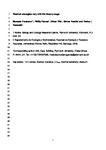Thermal strategies vary with life history stage.
| dc.contributor.author | Truebano, M | |
| dc.contributor.author | Fenner, P | |
| dc.contributor.author | Feistel, Susanne | |
| dc.contributor.author | Rundle, Simon | |
| dc.contributor.author | Rezende, EL | |
| dc.date.accessioned | 2018-06-18T11:15:04Z | |
| dc.date.issued | 2018-04-15 | |
| dc.identifier.issn | 0022-0949 | |
| dc.identifier.issn | 1477-9145 | |
| dc.identifier.other | ARTN jeb171629 | |
| dc.identifier.uri | http://hdl.handle.net/10026.1/11672 | |
| dc.description.abstract |
With both global surface temperatures and the incidence and intensity of extreme temperature events projected to increase, the assessment of species' sensitivity to chronic and acute changes in temperature has become crucial. Sensitivity predictions are based predominantly on adult responses, despite the fact that early life stages may be more vulnerable to thermal challenge. Here, we compared the sensitivity of different life history stages of the intertidal gastropod Littorina obtusata using thermal death time curves, which incorporate the intensity and duration of heat stress, and used these to calculate upper critical thermal limits (CTmax) and sensitivity to temperature change (z). Early (larval) life stages had both a lower CTmax and a lower z than adults, suggesting they are less good at withstanding short-term extreme thermal challenges but better able to survive moderate temperatures in the long term. This result supports the predicted trade-off between acute and chronic tolerance to thermal stress, and is consistent with the different thermal challenges that these stages encounter in the intertidal zone. We conclude that different life history stages employ different thermal strategies that may be adaptive. Our findings caution against the use of predictions of the impact of global warming that are based on only adult responses and, hence, which may underestimate vulnerability. | |
| dc.format.extent | jeb171629- | |
| dc.format.medium | Electronic | |
| dc.language | en | |
| dc.language.iso | en | |
| dc.publisher | Company of Biologists | |
| dc.subject | CTmax | |
| dc.subject | TDT curves | |
| dc.subject | Thermal sensitivity | |
| dc.subject | Thermal tolerance | |
| dc.subject | Trade-off | |
| dc.title | Thermal strategies vary with life history stage. | |
| dc.type | journal-article | |
| dc.type | Journal Article | |
| dc.type | Research Support, Non-U.S. Gov't | |
| plymouth.author-url | https://www.ncbi.nlm.nih.gov/pubmed/29559547 | |
| plymouth.issue | Pt 8 | |
| plymouth.volume | 221 | |
| plymouth.publication-status | Published | |
| plymouth.journal | Journal of Experimental Biology | |
| dc.identifier.doi | 10.1242/jeb.171629 | |
| plymouth.organisational-group | /Plymouth | |
| plymouth.organisational-group | /Plymouth/Admin Group - REF | |
| plymouth.organisational-group | /Plymouth/Admin Group - REF/REF Admin Group - FoSE | |
| plymouth.organisational-group | /Plymouth/Faculty of Science and Engineering | |
| plymouth.organisational-group | /Plymouth/Faculty of Science and Engineering/School of Biological and Marine Sciences | |
| plymouth.organisational-group | /Plymouth/REF 2021 Researchers by UoA | |
| plymouth.organisational-group | /Plymouth/REF 2021 Researchers by UoA/UoA07 Earth Systems and Environmental Sciences | |
| plymouth.organisational-group | /Plymouth/Research Groups | |
| plymouth.organisational-group | /Plymouth/Research Groups/Marine Institute | |
| plymouth.organisational-group | /Plymouth/Users by role | |
| plymouth.organisational-group | /Plymouth/Users by role/Academics | |
| plymouth.organisational-group | /Plymouth/Users by role/Researchers in ResearchFish submission | |
| dc.publisher.place | England | |
| dcterms.dateAccepted | 2018-03-14 | |
| dc.rights.embargodate | 2019-3-20 | |
| dc.identifier.eissn | 1477-9145 | |
| dc.rights.embargoperiod | 6 months | |
| rioxxterms.versionofrecord | 10.1242/jeb.171629 | |
| rioxxterms.licenseref.uri | http://www.rioxx.net/licenses/under-embargo-all-rights-reserved | |
| rioxxterms.type | Journal Article/Review |


